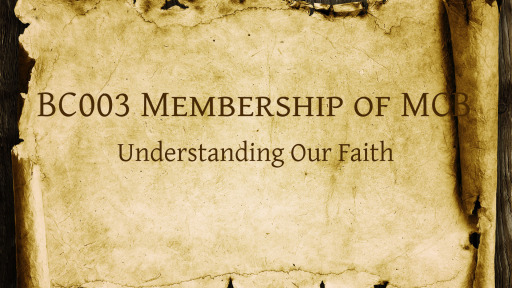Membership of MCB

Why become a Member?
As a young man, Joshua Harris’s attitude toward the church reflected that of many people today. Harris writes:
When I graduated from my church’s high school youth group, I started visiting around. I loved God and had big dreams for how I wanted to serve Him, but I didn’t see any reason to get too involved in one church. By then, I thought I knew all there was to know about church, and I wasn’t impressed. Most churches struck me as out-of-date and out-of-touch. There had to be better, more efficient ways to accomplish great things for God.1
He considered the church secondary, outmoded, inefficient, and a hindrance. It wasn’t that he didn’t love God or God’s people. He just didn’t think that belonging to a particular church was important, and might even be a hindrance.
Joshua is not alone. Many people think that church—especially church membership, that is, actually signing up and joining—is a spiritual relic destined to hinder spiritual freedom and fruitfulness.
The reasons for this view of church membership are many. Some Christians are just plain indifferent to church membership. They can take it or leave it; they’re neither excited nor negative toward the church. It just doesn’t matter to them.
Others are ignorant. They are uninformed. They’ve never considered the Bible’s view of the local church.
Still others are indecisive. They can’t make up their minds about joining. Perhaps they’re the kind of people who never really make decisions; decisions tend to happen to them.
And there are the independent types. They are “Lone Ranger Christians” who don’t want to be saddled with the burdens of church membership. They don’t want people “in their business.” They want to come into a church, consume what they need, and leave unattached.
Finally, there are those who are slow to commit to a local church because their affections are inverted. They have strong attachments to a “home church” in the town they grew up in, and yet their bodies are hundreds of miles away. They can’t bring themselves to join a church where they live because they’ve never emotionally left a church from their past.
At root, all of these perspectives on the local church stem from the same problem: a failure to understand or take seriously God’s intent that the local church be central to the life of his people. People don’t become committed church members—and therefore healthy Christians—because they don’t understand that such a commitment is precisely how God intends his people to live out the faith and experience Christian love.
God wants his people to be at the centre of His Church.
Because we cannot live the Christian life on our own.
There is slight evidence that the early church kept some lists associated with its membership. For example, lists of widows were kept (1 Tim. 5:9). Also, Christians in the local church voted for some actions. It was the “majority” who voted to remove the man from membership in the church at Corinth (2 Cor. 2:6).
Electing leaders, submitting to them, regulating membership, keeping lists, and voting only make sense if a known, identifiable, and distinct body is recognized. So while the Bible doesn’t provide us with a biblical treatise on membership per se, there is enough evidence in the inspired record to suggest that some form of membership was practiced and was necessary to the church’s operation. Church membership is no less important in our day.
